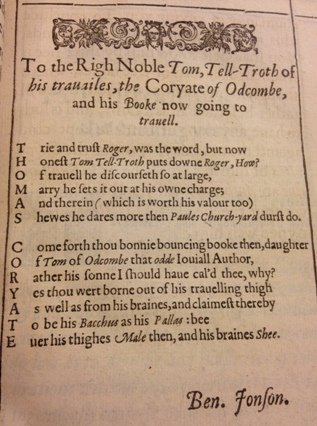Thomas Coryat's grandly titled book, Coryats crudities; hastily gobled vp in five moneths trauells in France, Sauoy, Italy, Rhetia co[m]monly called the Grisons country, Heluetia alia`s Switzerland, some parts of high Germany, and the Netherlands; newly digested in the hungry aire of Odcombe in the county of Somerset, & now dispersed to the nourishment of the trauelling members of this kingdome, is an intriguing account of his travels through Europe, combining mishaps and adventures with more serious observations of customs, dress and architecture.
He is keen to encourage others to follow in his footsteps and see the world: "Since then I have thus farre ventured with them, I will take occasion to speake a little of the thing which begat and produced these my observations, even of travell into forraine (foreign) coutnries, whereby I may the better encourage Gentleman and lovers of travell to undertake journeys beyond the seas. Of all the pleasures in the world travell is (in my opinion) the sweetest and most delightfull."
This reminds me of the opening lines of The Two Gentlemen of Verona, where Valentine encourages Proteus to see the wonders of the world, instead of wasting his youth at home.
Coryat's extensive (over 600 pages!) account begins with a wonderful title page which hints at the anecdotes within:

Here we see the Tom Coryat being seasick (or 'feeding the fishes', as he puts it), his lice-ridden and travel-worn clothes (the scarecrow-like image), attempting to steal grapes, being pelted by eggs and escaping in a gondola. In the centre is his portrait (which he didn't rate as being a good likeness!), surrounded by representatives of the different countries (Gallia with vines, Germania being sick and carrying a barrel of ale and Italia flashing her chest!).
This title page was distributed as a way of getting friends at court to write the customary prefatory eulogies for the volume. Others joined in and it became quite the trend to write tongue-in-cheek verses praising Coryat and his work. The book contains fifty six of these, including one from Ben Jonson:

Coryat got into all sorts of diplomatic scrapes, being far from 'politically correct'! He attempted to convert a rabbi to Christianity and had to be rescued in an ambassadorial gondola, and also antagonised Roman Catholics by objecting to their rites. The most dangerous moment of his travels came, however, when he risked attack for stealing grapes from a vineyard in the Black Forest. He appears to have taken great delight in observing how aspects of everyday life differ in foreign countries. He discovered the residents of Cremona using fans and umbrellas and is credited with being the first person to use the word 'umbrella' in the English language. In Basel, he observed women wearing their hair in "a very strange and phantasticall fashion", involving two long locks, half a yard long and twisted with "pretty silked ribbands or fillets of sundry colours". He is also said to have given the first English version of the story of William Tell. In Italy he was none to pleased to find that the best meats come sprinkled with cheese, which he "loves not so much as the Welshmen do". His love of novelty even extended to his adopting some of the customs he approved of. He took home a table fork after observing gentlemen in Italy using these (as a more hygienic way of eating) and explains how he is teased about this by friends in England.
Coryat's Crudities also includes drawings some of the things he saw, including this amazing wine barrel in Heidelberg (note Coryat standing on top of it, enjoying a nice glass of wine!).

He became known as the 'Odcombian Legge-stretcher' as a result of his meanderings by foot (he was from a place called Odcombe in Somerset). This was something of a misnomer as he used other forms of transport to get around Europe. It did, however, inspire him to embark on a true walking tour on his next adventure. In 1612, he sailed to Constantinople and, from there, went to Jerusalem with a caravan of pilgrims. After this, he decided to walk to India to cement his reputation as the world's greatest walker. He is thought to have covered at least 3300 miles, often relying on the hospitality of the people he met. What makes this all the more remarkable is that he was the first true English tourist in India, having no thoughts of trade or religious zeal as the motive for his journey. We have a second book from 1616 entitled Thomas Coriate traueller for the English vvits: greeting. From the court of the Great Mogvl, resident at the towne of Asmere, in easterne India. This gives some account of this period of his life, including a description of the Great Mogul's pet unicorns and a wonderful woodcut of Tom Coryat on an elephant.


Thomas Coryat sadly died in December 1617 at the East India Company's factory at Surat - reputedly from a combination of dysentery and being given too much sack. He had written of how he hoped to keep travelling, but at least died pursuing his passion. He clearly wanted to be known and remembered and has perhaps achieved some of the fame he desired, given that nearly four hundred years later he is still being written and talked about.

